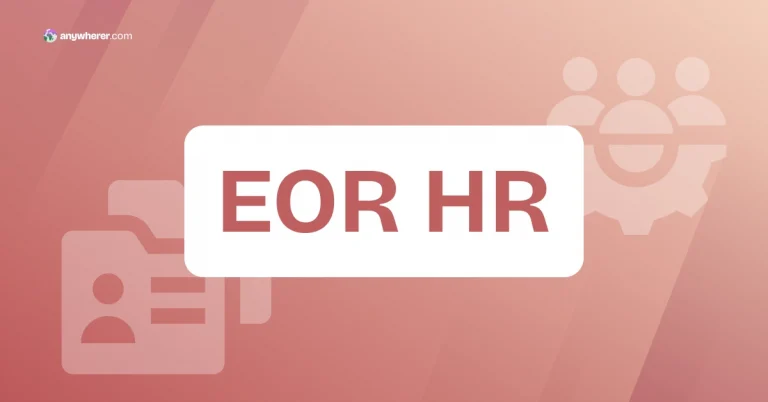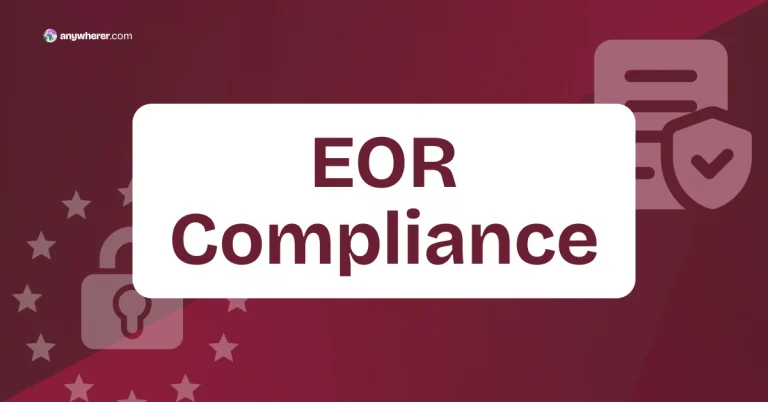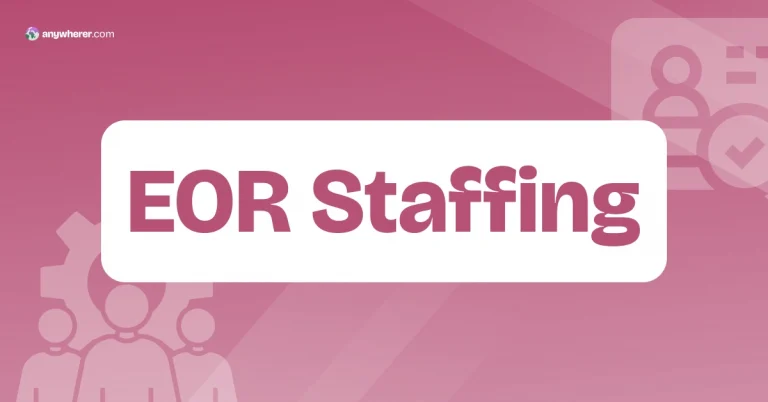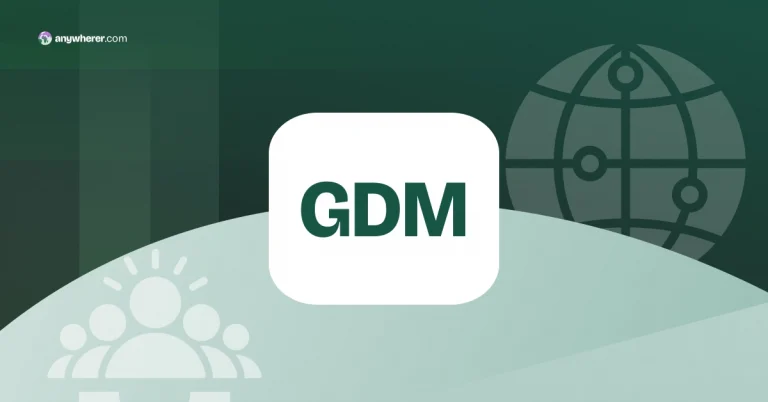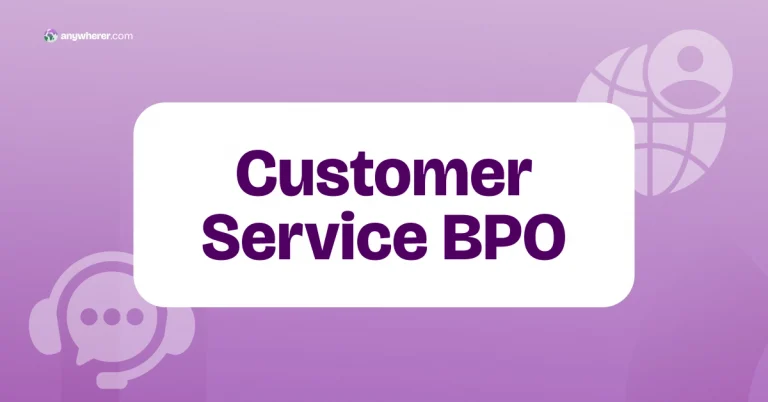What Is RPO? RPO Definition and Key Differentiators
RPO stands for Recruitment Process Outsourcing, a suite of services that enable businesses to gain a competitive edge in talent acquisition. To do so, RPO providers focus specifically on addressing recruitment challenges and optimizing hiring processes.
With cost efficiency, employer brand reputation, and employee retention in mind, outsourcing recruitment process is a viable alternative to traditional recruitment methods.
RPO Definition
RPO is a strategic business solution in which a company transfers all or part of its recruitment processes to an external service provider.
Unlike traditional recruitment agencies, RPO meaning implies providers embed themselves into the organization’s hiring strategy, acting as an extension of the internal HR team. This allows businesses to achieve scalable, efficient, high-quality recruitment tailored to their unique needs.
To accurately define Recruitment Process Outsourcing, it’s important to highlight that RPO is more than just a recruitment service – it is a strategic partnership that empowers businesses to overcome modern hiring challenges, including the following:
- The struggle of attracting quality candidates: 76% of hiring managers consider attracting the right job candidates their most significant challenge.
- The job landscape being redefined: 23% of jobs and 44% of workers’ skills are predicted to be disrupted by emerging technologies in the next five years.
- The escalating struggle to retain employees: surveys report a 10-year high in job change interest among US employees.
- The surging cost per hire: a 14% increase in costs was observed over the past 5 years in the US, with an average of $4,700 and reaching $28,000 for highly specialized or executive roles.
To address these and many other recruitment pitfalls, RPO recruitment services revolutionize hiring by combining expertise, technology, and strategy, thus turning hiring challenges into growth opportunities for businesses.
RPO Meaning vs Traditional Hiring: What Sets It Apart?
While traditional recruitment methods may be sufficient for businesses with more straightforward or lower-volume hiring requirements, the RPO model brings excellent value to businesses with dynamic or complex hiring needs – all thanks to its streamlined processes, industry expertise, and other benefits of outsourcing recruitment and selection process.
| Goals RPO Excels at | Goals When Choosing Traditional Recruitment |
|---|---|
| Scale recruitment efforts | Maintain cost control for low-volume hiring |
| Reduce time-to-hire | Focus on cultural fit of employed hires |
| Handle fluctuating or high-demand recruitment needs | Emphasize efforts on employer branding |
| Access broader talent pools | Minimize external dependency |
| Relieve overburdened internal teams | Grow the in-house HR team’s expertise |
The key differentiator between RPO and traditional recruitment lies in flexibility and speed of hiring. RPO offers a scalable solution, enabling organizations to ramp up recruitment efforts and significantly reduce time-to-fill quickly.
Traditional recruitment, on the other hand, is a practical choice for businesses valuing internal alignment and independence. It allows companies to maintain control over the hiring process and, for those that prioritize it, to find employees who perfectly align with their corporate culture – an area that is not typically the primary focus of RPO providers.
Quick Overview of the RPO Model
Recruitment Process Outsourcing solutions are not just about outsourcing hiring tasks; it’s a transformative partnership that becomes an integral part of a company’s culture and vision.
RPO providers embed themselves within an organization, aligning their strategies with the company’s goals, values, and long-term objectives. This, in turn, allows for building a strong recruitment foundation that drives long-term success and growth.
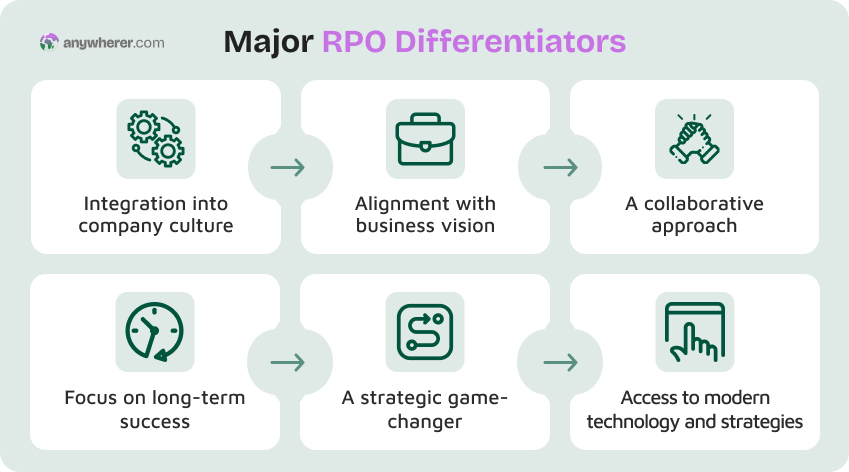
Given its key differentiators, RPO offers a unique suite of solutions and expertise that has the potential to bring significant value to businesses. However, there are some drawbacks to consider as well. Let’s explore these in more detail.
RPO Advantages and Disadvantages
Just like any other recruitment method, RPOs have both benefits and potential drawbacks. Considering both RPO advantages and disadvantages, businesses should weigh their options carefully by evaluating their current recruitment challenges, long-term goals, and internal capacity.
Key RPO Benefits and Challenges
- Quick hiring and onboarding
- Scalability
- Cost efficiency
- Access to specialized talent
- Data-driven insights
- Lack of in-house expertise development
- Potential loss of control
- Long implementation times
- Misalignment with company culture
- High dependency on the RPO provider
Quick Hiring vs. Lack of In-House Expertise Development
One of the main RPO advantages lies in the fact that services can significantly accelerate recruitment timelines – all thanks to their access to advanced tools, knowledge of extensive talent networks, and proficiency in streamlining processes. As a result, time-to-hire for critical roles can be reduced to a matter of weeks or even days.
However, concerning hiring efficiency, one of the most common challenges of Recruitment Process Outsourcing arises: when an RPO provider manages most recruitment tasks, companies might miss opportunities to build and maintain strong in-house HR expertise.
How to solve: Ensure collaboration between the RPO and internal teams, inspire a continous exchange of recruitment best practices.
Scalability vs. Potential Loss of Control
RPOs allow organizations to scale their workforce seamlessly without overwhelming internal HR teams. Using their specialized expertise and resources, they efficiently handle high-volume recruitment for seasonal peaks and other recruitment challenges, from new market entry to large-scale projects.
In the meantime, outsourcing recruitment can make businesses fear losing control over their hiring decisions, especially when there is limited collaboration with an RPO provider.
How to solve: establish clear governance and communication protocols. Also, ensure regular updates throughout the process, focusing on collaborative decision-making.
Cost Efficiency vs. Long Implementation Times
RPOs are often viewed as much more cost-effective solutions compared to traditional hiring methods. They save the company’s costs by handling time-consuming tasks (sourcing, screening, onboarding, etc.) and freeing internal HR teams to focus on strategic priorities. Plus, thanks to their ability to adapt to fluctuating hiring demands, companies can avoid unnecessary costs by paying only for the services they need.
However, working with the RPO often implies lengthy setup times due to implementation complexities, such as integrating systems, processes, and policies into the existing company’s workflows.
How to solve: to address lengthy setup times with RPOs, set realistic timelines, break milestones into manageable steps, and implement changes gradually to ensure smooth integration with existing workflows.
Access to Specialized Talent vs Misalignment with Company Culture
Many RPOs possess in-depth expertise in sourcing niche roles, thus being able to connect businesses to specialized talent pools. This ensures the right candidates for highly technical or industry-specific positions.
In the meantime, RPO providers may not understand the company’s culture well enough to convey it efficiently to potential candidates. By failing to do so, they risk hiring employees that might not be the right cultural fit for the company.
How to solve: incorporate a detailed onboarding process for the RPO provider, provide training and active communication to ensure alignment, and provide regular feedback.
Data-Driven Insights vs. High Dependency on the RPO Provider
RPO providers use analytics to offer actionable insights, thus helping organizations refine their recruitment strategies and forecast future workforce needs more effectively.
However, relying too heavily on an RPO provider might pose challenges if the contract ends, services are interrupted, or the provider underperforms.
How to solve: keep track of recruitment processes and have a backup plan in case of issues. Use a hybrid model where your team manages key roles, and the RPO handles bulk or specialized hiring to ensure smooth operations.
When exploring RPO and its role in optimizing recruitment, it’s helpful to understand other outsourcing models. Businesses often ask, what is an EOR (Employer of Record)? An EOR handles global employment compliance, while PEO meaning refers to a provider that co-manages HR functions for companies with legal entities. Additionally, BPO definition (Business Process Outsourcing) covers broader outsourcing of entire business functions, including HR and recruitment. By understanding how RPO, EOR, PEO, and BPO models differ, businesses can choose the right solution to streamline hiring, ensure compliance, and optimize workforce management for long-term success.
Myths and Misconceptions About the RPO Process
As the popularity of RPO services continues to rise, so too do the myths and misconceptions surrounding them.
Misunderstandings associated with RPOs can not only create unnecessary hesitation among businesses but also be harmful since they might prevent companies from realizing the full potential of RPO services. Yet, fear not – we’re here to debunk the most common misconceptions.

Myth #1: RPO Is Only for Large Companies
Some businesses believe RPO services are tailored exclusively for large enterprises with high recruitment volumes.
In reality, the opposite is true – RPO is designed to be scalable and adaptable for organizations of all sizes. Here’s how:
- RPO providers offer flexible solutions catering to small and medium-sized businesses and large corporations.
- SMBs can leverage expert recruiters and advanced tools without the overhead costs and complexities of building in-house expertise.
- Cost-efficient solutions are tailored to the unique needs of smaller organizations, ensuring a strong return on investment.
Myth #2: RPO Replaces the Internal HR Team
Another common misconception goes like this: it is believed outsourcing recruitment through RPO completely eliminates any need for an internal HR team.
In reality, RPO complements and supports internal HR teams. Here’s why:
- RPO providers handle time-intensive tasks like candidate sourcing, screening, and compliance, freeing internal HR to focus on strategic priorities.
- Internal teams can work in tight collaboration with RPO providers to align recruitment efforts with company goals.
- Partnership with RPO is not an HR replacement but a balanced division of recruitment responsibilities.
Myth #3: RPO Providers Use a Standard, One-Size-Fits-All Approach
Some businesses worry that RPO services won’t be able to adapt appropriately to their unique organizational needs and culture.
In reality, most RPO solutions are highly flexible and customizable. Here’s how:
- Providers tailor their recruitment strategies to reflect a company’s culture and values.
- Collaborative partnerships ensure recruitment processes are aligned with specific business objectives.
- RPO providers can efficiently adapt to particular hiring challenges, whether for niche talent or high-volume roles.
Myth #4: RPO Is Too Expensive
Many assume that RPO services are costly and only feasible for businesses with large budgets.
In reality, RPO can actually save money. Here’s how affordable recruitment process outsourcing services bring value to businesses:
- Streamlined recruitment processes reduce time-to-hire and cost-per-hire.
- Access to advanced technologies lowers overhead costs.
- Efficient hiring strategies improve workforce quality, reducing turnover and long-term expenses.
Myth #5: RPO Reduces Employer Control Over Recruitment
Here’s another major myth related to partnering with an RPO: outsourcing recruitment to an RPO will lead to losing control over all hiring decisions.
In reality, RPO enhances collaboration while maintaining employer control. Consider the following:
- Employers retain full decision-making authority, with RPO providers acting as an extension of their team.
- Transparent reporting and regular updates keep companies well-informed of any updates.
- Collaborative workflows ensure alignment with organizational goals and hiring standards.
Business Impact of RPO Recruitment Services Across Industries
RPO services are widely used across various industries, particularly rapidly evolving ones. Furthermore, according to market trends, the demand for scalable recruitment solutions like RPOs is only growing.
Based on the Allied Market Research illustrated below, experts predict that the IT and Telecom sectors will lead with the fastest growth rate in the coming years. At the same time, industries like BFSI, healthcare, and ITES are expected to show steady growth.
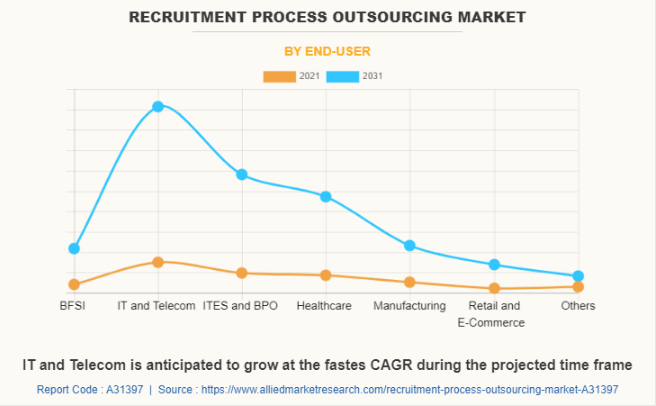
So, what exactly attracts businesses from specific domains to RPO services? And how do they benefit from them? Let’s explore this in detail.
BFSI
The BFSI industry operates in a highly regulated and competitive environment, where attracting top-tier talent is critical for maintaining trust and meeting complex regulatory standards.
In this case, RPO provides a strategic advantage with its expertise and a rich suite of services.
The industry’s significant challenges tackled with RPO are:
- Stiff competition from tech and fintech firms offering innovative work environments.
- Ensuring compliance with stringent industry standards.
- Demand for niche talent with expertise in emerging tech – AI, blockchain, digital banking, etc.
RPO providers help businesses overcome recruitment challenges. They ensure hiring processes align with complex regulatory requirements and enhance employer branding. This enables companies to compete effectively for top-tier professionals in the competitive industry.
IT and Telecom
The fast-paced IT and telecom industries demand rapid scaling and niche skill sets to keep up with technological advancements and global competition.
Key challenges that RPO helps resolve include:
- Competing for niche skill sets in AI, data science, and cybersecurity.
- Scaling quickly for projects and managing global or remote hiring.
- Retaining top talent in a highly competitive job market alongside industry giants.
To tackle these challenges, RPO delivers tailored solutions to ensure businesses keep a competitive edge. RPO helps IT and telecom companies stay agile by reducing time-to-hire for high-demand roles, providing access to global RPO talent pools, and offering scalable solutions for project-based or large-scale hiring needs.
ITES and BPO
ITES and BPO industries thrive on efficiency and high-volume hiring to support back-office operations and customer support.
The industry challenges addressed by RPO include:
- Managing frequent employee turnover in entry-level and customer service roles.
- Scaling workforce quickly during peak seasons while maintaining quality and efficiency.
- Sourcing multilingual and culturally aligned talent for international clients.
RPO adds value for this industry domain in a couple of ways: scaling recruitment for seasonal spikes, leveraging strategies to reduce turnover, and ensuring quality candidates align with business objectives, to name a few. By focusing on cultural alignment, IT Recruitment Process Outsourcing services help organizations reduce the high turnover rates common in these sectors, ensuring that hires are more likely to stay and perform well.
Besides, many RPO providers are also proficient in leveraging advanced applicant tracking systems and AI-driven sourcing tools, which allows for identifying and onboarding entry-level talent faster.
Healthcare
Healthcare requires highly specialized talent and rapid hiring to address staff shortages while maintaining compliance with strict regulations.
Key challenges include:
- Addressing staffing shortages caused by high demand, burnout, and an aging workforce.
- Complying with healthcare regulations.
- Filling highly specialized roles like nurses, radiologists, and technicians.
RPO supports healthcare organizations by addressing these industry-specific recruitment challenges. RPO handles background checks and credential verifications, thus reducing risks and meeting legal standards.
Besides, thanks to scalable recruitment solutions, RPO minimizes the risks of staff shortages, thus adapting to fluctuating demands, whether for immediate needs or long-term planning.
Manufacturing
The manufacturing industry often faces fluctuating workforce demands and skill shortages in specialized trades.
RPO helps manufacturing businesses address these challenges:
- Fluctuating workforce demands and skill shortages in specialized trades.
- Time-sensitive hiring for production lines.
- Supporting global recruitment for manufacturing plants in multiple locations.
To address these unique challenges, RPO offers scalable, data-driven solutions. For example, using advanced analytics, RPO helps manufacturing businesses predict workforce shortages based on production cycles and market demands. This approach allows organizations to minimize hiring delays and reduce recruitment costs.
Retail
Retail organizations frequently face the challenges of scaling for store openings and seasonal spikes in workforce needs.
Retailers opt for RPO to address the following challenges:
- Scaling workforces for new store openings and managing seasonal spikes.
- Ensuring quality for high-volume hiring.
- Sourcing multilingual staff to serve diverse customer bases in specific locations.
RPO streamlines high-volume recruitment by leveraging advanced sourcing tools, applicant tracking systems, and extensive talent to fill critical roles quickly. This ensures fast and efficient hiring, strengthens employer branding, and enables attracting and retaining top talent.
The RPO Process Explained
Without a clear understanding of the entire RPO process, businesses risk unmet expectations and missed opportunities to maximize the advantages of Recruitment Process Outsourcing to their fullest.
Let’s dive into the key steps in Recruitment Process Outsourcing services.
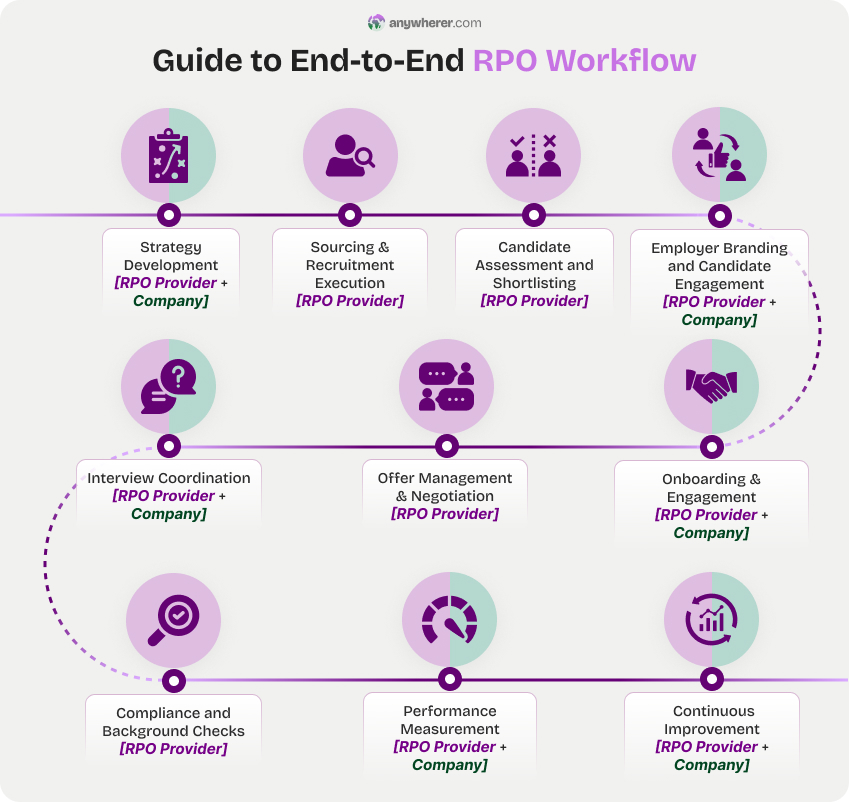
- Strategy development. The company collaborates with the RPO provider to design a customized recruitment strategy. This includes but is not limited to such action steps as defining sourcing channels, hiring timelines, and setting up KPIs.
- Sourcing and recruitment execution. The RPO talent acquisition implies sourcing high-quality candidates using talent networks, job boards, social media platforms, and other resources. At this stage, it handles all major recruitment tasks required to maintain an efficient hiring pipeline: job postings, initial screenings, and pre-interview processes.
- Candidate assessment and shortlisting. The RPO agency conducts technical assessments, behavioral interviews, and other evaluations to curate a shortlist of the best-suited candidates for the roles.
- Employer branding and candidate engagement. The company and the RPO provider work side by side to efficiently convey and promote the company’s values and culture, thus strengthening employer branding and empowering a positive candidate impression of the company.
- Interview coordination. The RPO provider schedules interviews between shortlisted candidates and internal hiring managers.
- Offer management and negotiation. The RPO provider proactively engages with the candidate and handles the discussion related to offer letters, salary, and benefit negotiations per market standards.
- Onboarding and engagement. The RPO provider facilitates the candidate onboarding process, from documentation management to compliance processes to orientation. In the meantime, the company ensures that new hires are welcomed and supported during their transition.
- Compliance and background checks. The RPO provider verifies the candidates’ background, credentials, and other essential details, defining the candidate’s probability of scoring the role.
- Performance measurement. The company and the RPO provider monitor new hire performance. To evaluate recruitment success, predefined metrics are used: time-to-productivity, quality of hire, and retention rates, to name a few.
- Continuous improvement. Regular reviews are conducted by the company and the RPO provider to gather feedback, optimize recruitment strategies, and address evolving business needs.
RPO Pricing Models
Recruitment Process Outsourcing rates vary based on service levels and business needs.
RPO Cost Structures
- Upfront consulting fees
- Pay-per-hire vs. flat fees
- Performance bonuses
- Monthly retainer fees
- Cost-per-employee
- Blended model
- Project-based fees
Key RPO costs include:
- Upfront consulting fees – imply initial fees for assessing recruitment needs and creating a tailored strategy.
- Pay-per-hire vs. flat fees – flexible pricing options based either on RPO cost per hire or annual cost for recruitment services.
- Performance bonuses – may be offered for meeting recruitment goals on top of pre-agreed Recruitment Process Outsourcing pricing.
- Monthly retainer fees – a fixed monthly fee for ongoing recruitment support regardless of the number of hires.
- Cost-per-employee – a fixed fee charged per employee hired, often with volume discounts.
- Blended model – combines multiple pricing models, like pay-per-hire with performance bonuses.
- Project-based fees – one-time fee for specific recruitment projects or role.
Overall, Recruitment Process Outsourcing cost can offer significant savings compared to in-house recruitment. While in-house teams invest in tools, time, and resources for sourcing, screening, and compliance, RPO providers streamline these processes, reducing time-to-hire and mitigating legal risks. RPO also helps avoid costs associated with internal turnover and overhead, offering a more efficient, scalable solution for talent acquisition.
RPO Consulting Services
Considering that an RPO model implementation is a multifaceted process requiring careful planning and execution, a viable assistant comes in – RPO consulting services.
RPO consulting refers to professional services offered by recruitment experts who guide businesses through the end-to-end process of evaluating, selecting, and implementing RPO services. In doing so, an RPO consultant guarantees a smooth transition, optimized recruitment strategies, and minimized disruptions to existing operations. This service goes far beyond mere recruitment – RPO management consultants help organizations anticipate future workforce needs, strengthen employer branding strategies, and implement innovative technologies for further efficiency.
Common RPO Consulting Services

Workforce Planning

Talent Market Intelligence

Employer Branding Guidance

Vendor Selection

Custom Recruitment Strategy Design

Global Talent Sourcing

Turnover Reduction Strategies

Performance Monitoring

Compliance Support
Compared to full RPO solutions, RPO consulting is well-suited for companies that seek to address specific challenges, improve overall recruitment efficiency, and implement targeted changes without committing to a fully managed service model. See the table below to explore their differences in greater depth.
| Aspect | RPO Consulting | Full RPO Solutions |
|---|---|---|
| Scope of work | Focus on strategy and optimization | Covers end-to-end recruitment operations |
| Costs | Lower cost; no operational involvement | Higher cost; comprehensive service |
| Implementation | Quick integration | Longer setup due to full management |
| Ownership | Company control is retained | Recruitment ownership is transferred to RPO |
| Technology use | Mostly uses existing systems | Includes new tech integration |
| Time to value | Quick results for immediate needs | Longer timelines for strategic goals |
Choosing the Right RPO Partner: Checklist for Success
Before partnering with an RPO partner, ensure that you thoroughly evaluate your organization’s needs, challenges, and long-term goals.
This way, you can identify the specific areas where RPO can add the most value – and also avoid RPO providers that may not be the right fit for your organization.
Major red flags to avoid in RPO providers include:
- Rigid contracts with limited flexibility
- Lack of transparency, unclear pricing structures
- No clear KPIs or performance metrics
- Limited scalability for changing business needs
- Delayed responses or unclear reporting structures
- Lack of employer branding support or service limitations
- Overpromising without evidence or case studies
The checklist below will help you evaluate potential RPO partners, ensuring you make an informed decision that delivers measurable results and fosters a successful partnership.
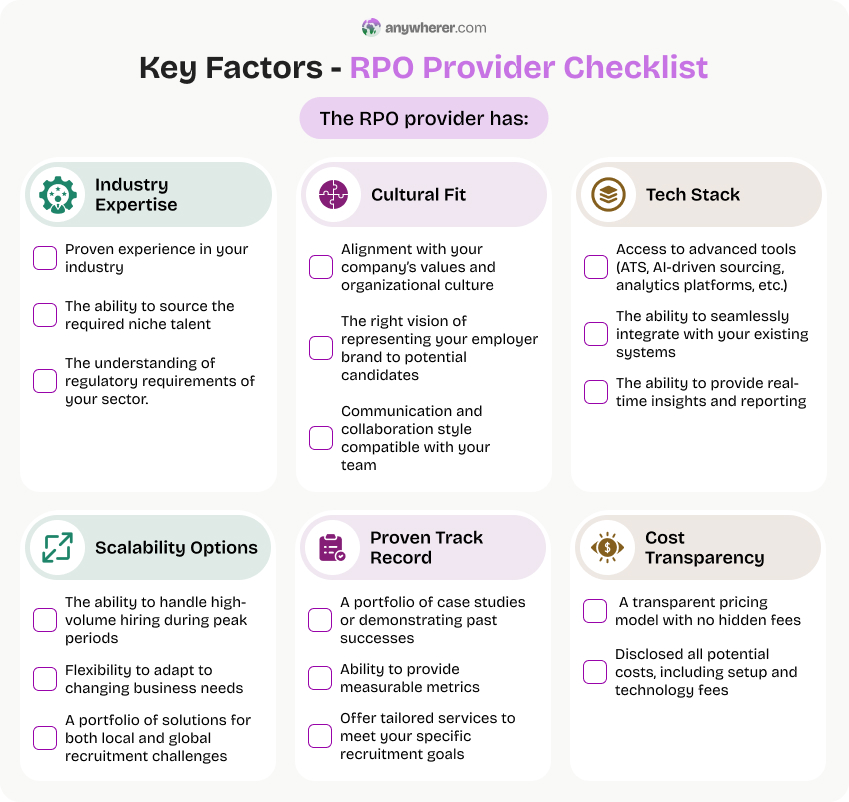
Must-Ask Questions for Your RPO Provider
To verify the provider’s ability to handle growth and the changing requirements:
- If our company undergoes rapid expansion, how quickly can you scale your recruitment operations?
- Can you provide examples of how you’ve adapted your services for clients with changing needs?
- How do you handle hiring for niche or hard-to-fill positions?
- Do you offer both local and offshore Recruitment Process Outsourcing?
To ensure the provider delivers measurable value:
- How have you reduced cost-per-hire for clients in industries similar to ours, and by what percentage?
- How do you calculate ROI for your services, and can you provide examples from similar clients?
- Are there any hidden costs we should be aware of, such as technology or setup fees?
To assess the provider’s proficiency in modern tools and approaches:
- What technologies and tools do you use for sourcing, screening, and reporting?
- How do your tools integrate with our existing HR systems and platforms?
- How do you commonly track recruitment performance?
To confirm the provider’s commitment to transparency:
- What KPIs do you typically track, and how do you ensure they align with our goals?
- How often will we receive performance updates, and what level of detail will they include?
- Can you provide examples of how you’ve improved key metrics for other clients, such as time-to-hire or retention rates?
To understand the commitment to long-term partnership:
- What ongoing support do you provide after implementation?
- How do you handle feedback or issues during the partnership?
- Do you offer regular strategy reviews to ensure the recruitment process evolves to meet our business needs?
Final Thoughts: Is RPO Agency the Missing Piece for Your Talent Strategy?
Recruitment Process Outsourcing offers more than just operational support – it provides strategic value that aligns talent acquisition with business goals. If your business faces challenges like rapid scaling, high-volume hiring, niche talent acquisition, global expansion, or improving recruitment efficiency and compliance, RPO could be the strategic solution you need.
RPO providers specialize in identifying and resolving these and numerous other bottlenecks thanks to tailored strategies, modern technologies, and a profound commitment to optimize every step of the recruitment process. However, the success of RPO depends on selecting the right partner who understands your industry, culture, and long-term objectives. Therefore, to find the right RPO partner, ensure you meticulously evaluate its expertise, track record, and adaptability, among other critical factors.
FAQs About RPO Recruitment Services
What is Recruitment Process Outsourcing?
The implementation timeline varies depending on the complexity of the organization’s needs, the scope of services, and the size of the workforce. Typically, on-demand RPO implementation takes 4-12 weeks, during which the provider collaborates with the company to design workflows, integrate technology, and align processes.
What does RPO meaning refer to in staffing?
An RPO staffing is a service where a company outsources all or part of its recruitment process to an external provider. This way, the Recruitment Process Outsourcing staffing provider acts as an extension of the company’s HR team, managing tasks such as sourcing, screening, interviewing, and onboarding candidates.
How does RPO work?
Recruitment Process Outsourcing works by partnering with an external provider, including offshore RPO options, to manage all or part of a company’s recruitment process. The RPO provider acts as an extension of the organization’s HR team. Thus, the benefits of Recruitment Process Outsourcing RPO include improved recruitment efficiency, access to a broader talent pool, reduced hiring costs, and enhanced candidate quality, to name a few.
How is the success of an RPO engagement measured?
The success of an RPO engagement is typically measured by metrics like time-to-hire, quality of hire, cost-per-hire, hiring manager satisfaction, and how well the recruitment outcomes align with business goals.
How much does RPO cost and what are the hidden costs associated with RPO?
RPO costs vary based on the level of service, the specific needs of the business, and the recruitment strategy employed. Some hidden RPO fees may include transition costs during the initial setup phase, investments in new recruitment technologies, and the risk of potential over-reliance on the provider. However, with proper planning and a clearly defined Service Level Agreement, these risks can be effectively mitigated.
What level of control does the client retain over the recruitment process?
According to Recruitment Process Outsourcing meaning, clients retain strategic control, including decision-making for final candidate selection, approval of hiring strategies, and alignment with organizational goals. RPO providers handle operational aspects like sourcing, screening, and compliance but operate transparently and collaboratively.
Are RPO providers industry-specific, or can they handle multiple sectors?
Many RPO providers are industry-agnostic and offer services across multiple sectors. However, some providers specialize in specific industries like healthcare, technology, or finance, since these industries often require a deeper understanding of niche talent needs.
How does RPO handle high-volume hiring during peak seasons?
Global RPO providers handle high-volume hiring during peak seasons by scaling their recruitment teams, using talent pipelines they’ve built in advance, leveraging technology for faster screening, and adjusting strategies based on real-time hiring needs.
What industries are the fastest adopters of RPO?
According to recent surveys, the IT sector, healthcare, financial services, manufacturing, and retail are considered the fastest adopters of RPO. The talent solutions RPO is ideal for them in handling various challenges, from high competition for niche talent to rapid scaling needs to strict compliance requirements.
See how RPO services can reshape your recruitment strategy with unmatched speed and precision!

Yaryna is our lead writer with over 8 years of experience in crafting clear, compelling, and insightful content. Specializing in global employment and EOR solutions, she simplifies complex concepts to help businesses expand their remote teams with confidence. With a strong background working alongside diverse product and software teams, Yaryna brings a tech-savvy perspective to her writing, delivering both in-depth analysis and valuable insights.

